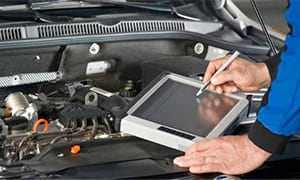What’s a Diagnostic Technician worth?

All too often I hear service managers complaining they can no longer find decent
technicians, and yet the truth is that the skills shortage hasn’t simply appeared out of
nowhere.
The truth is more confronting, and so most don’t wish to face it. The truth is that the skills
shortages we face today are a direct result of short sighted management over the past 20-
30 years or so within our industry.
Let’s look at a dealership’s investment necessary to develop such professionals.
Take your best Technician who has at least ten years’ brand experience and consider the
investment you’ve made in them. This may be through an apprenticeship scheme, and then
ongoing participation in manufacturer training courses. With all this investment, you’d like
to think that these guys will yield the highest monthly labour GP, but perhaps not anymore.
These days it’s the guys doing efficient maintenance work spinning the filters who achieve
the greatest returns, meanwhile your most decorated techs are typically conducting the
more complex diagnostic work, which can often be more difficult to recover labour, and all
too often at a reduced manufacturer’s warranty labour rate.
This becomes a vicious circle, as we start falling into the trap of getting the apprentices to
spin the filters to achieve the desired labour GP benchmarks we’re chasing, meanwhile
we’re not developing them to keep up-to-date with the latest technologies. These guys then
lose interest due to the monotony of service work, whilst you become more dependent on
the few guys who have the diagnostic skills necessary to fix the more complex jobs.
Apprentice retention rates will likely fall off as a result and the flow-on effect being that at
some point you find you don’t have sufficient resources with diagnostic capability to ensure
all vehicles flowing through the workshop are diagnosed correctly in the first instance.
Ultimately your limited diagnostic resources become stretched, and you start seeing your
fixed right first visit scores heading south. This obviously has a flow on effect to the bottom
line as manufacturers now remunerate dealers according to how well you service your
customers.
Perhaps it’s time we started looking at the indirect bonuses paid to dealerships through
customer satisfaction programmes. Surely we should attribute some of the monies paid
through such programmes to the efforts of the more experienced guys who play a key role
in ensuring the vehicle is diagnosed correctly the first time. Perhaps the metric of labour GP,
should be assessed in conjunction with fixed right first visit statistics.
What’s the true value of your most experienced home-grown technicians, who know your
product from bumper to bumper? (All things being equal, assuming they have a good
attitude and are intrinsically motivated in doing their job). If you don’t know it now, then
consider this. If they left tomorrow, could you replace them? If so, where would you get
them from, what would be the costs associated with finding them? What would be the
impact on the business (CSI scores etc.)? How long will it take you to bring another
tradesman up to speed from another brand?
A skilled labour force are the foundations of any service department. If you have high staff
turnover, then it’s likely you’ll be amongst the lower echelons of the CSI rankings. If you’re
CSI scores are poor, then chances are your bottom line financials will be too. Don’t wait for
your labour force to leave before assessing their value. Technology advances faster every
day, and having strong diagnostic skills are critical to the efficient operation of any modern
dealership.
